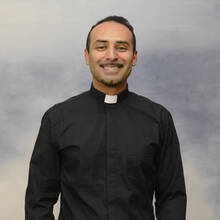We Desperately Need the Spirit Today
On Pentecost Sunday, the readings emphasize the Spirit being given to the community of disciples. While Acts of the Apostles and the Gospel of John differ in their accounts of the Spirit’s arrival, they agree in their description of the Spirit’s ability to provide the gift of harmony. This leads to a subtle meditation on the role of the Spirit in helping to foster understanding between one another. It also suggests, from another perspective, that estrangement between people today requires renewed faith in the Spirit.
Receive the holy Spirit. Whose sins you forgive are forgiven them, and whose sins you retain are retained. (Jn 20:22-23).
Can you hear the Spirit speaking when you pray?
What “mighty acts of God” does the Spirit wish to make real through your voice?
How can the Spirit lead you to forgiveness this week?
The first reading captures a familiar scene describing the birth of the church through the spirit. As the Spirit descends on the apostles, they begin to speak in strange languages. In their audience are faithful Jews from every corner of the known world. Rather than a cacophony, the sound, all present understand what they hear. “At this sound, they gathered in a large crowd, but they were confused because each one heard them speaking in his own language” (Acts 2:6). The text is almost comical: People were confused because they understood each other. They expected gibberish and misunderstanding.
That someone from Asia understands a Galilean speaking through the Spirit is astonishing, but this seems to be the point of the passage. The Spirit allows the community of faith to understand each other, even if only for a brief moment in time. “They were astounded, and in amazement” (Acts 2:7).
The Spirit also plays a significant role near the end of the Gospel of John. In a final appearance to his closest followers, a resurrected Jesus says, “Receive the Holy Spirit” (Jn 20:22). He continues with intriguingly detailed instructions. “Whose sins you forgive are forgiven them, and whose sins you retain are retained” (Jn 20:23). For a Christian, belief that one has received the Spirit is a prerequisite to restore a broken relationship with God.
This verse also includes the mysterious phrase, “Whose sins you retain are retained.” The church has never defined the meaning of these words, and it is difficult to understand in what circumstances they would apply today. Perhaps this is a recognition on Jesus’ part that certain types of wounds take a long time to heal, and in these cases time is warranted before complete forgiveness can occur.
The church has interpreted this Sunday’s Gospel passage as giving it the authority for the Sacrament of Reconciliation. A more fruitful understanding today might be that Christians have an obligation to forgive each other over time. It seems that a critical test of faith is that Christ’s disciples understand one another. That is only possible through constant forgiveness and trust that the Spirit works among all the faithful.








